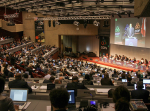 4 May 2015: On Monday, 4 May 2015, the twelfth meeting of the Conference of the Parties (COP) to the Basel Convention (BC), seventh meeting of the COP to the Rotterdam Convention (RC), and seventh meeting of the COP to the Stockholm Convention (SC) opened in Geneva, Switzerland. The meetings will include joint sessions of the COPs on issues that are on the agendas of at least two of the three conventions, including technical assistance, financial resources and mechanisms, and programmes of work and budgets.
4 May 2015: On Monday, 4 May 2015, the twelfth meeting of the Conference of the Parties (COP) to the Basel Convention (BC), seventh meeting of the COP to the Rotterdam Convention (RC), and seventh meeting of the COP to the Stockholm Convention (SC) opened in Geneva, Switzerland. The meetings will include joint sessions of the COPs on issues that are on the agendas of at least two of the three conventions, including technical assistance, financial resources and mechanisms, and programmes of work and budgets.
Key issues to be addressed during the meetings include, inter alia: the listing of new chemicals under the Stockholm and Rotterdam Conventions, adoption of technical guidelines under the BC, and financial and technical support for implementation of all three conventions. A “Friends of the President” group is expected to convene to work on compliance under the Stockholm and Rotterdam Conventions.
The meetings of the Conferences of the Parties (COPs) to the Basel, Rotterdam and Stockholm (BRS) Conventions opened with Jan Dusik, UNEP Regional Office for Europe serving as the “master of ceremonies.” BRS Executive Secretary Rolph Payet urged the integration of the chemicals and wastes cluster into the sustainable development agenda. He emphasized listing chemicals under the RC, adopting BC TGs on electrical and electronic waste (e-waste), and agreeing on compliance mechanisms for the RC and SC as important outcomes.
Stressing the COPs’ theme “from science to action, working for a safer tomorrow,” Clayton Campanhola, FAO, RC Co-Executive Secretary, underscored the importance of listing methamidophos, trichlorfon, as well as the severely hazardous pesticide formulations, fenthion and paraquat dichloride under the RC. Noting that chrysotile asbestos would be considered for a fifth time, he underscored that listing a chemical under the RC does not constitute a trade ban.
Bruno Oberle, Switzerland, noted that the synergies process increased the visibility of the chemicals and waste cluster, encouraged both deepening and broadening existing synergies and urged countries to ratify the Ban Amendment.
UNEP Executive Director Achim Steiner characterized the growth in chemicals production and use as a “fundamental” part of the modern economy while noting estimates that endocrine disruptors cost EUR157 billion in Europe alone and underscoring that occupational poisoning results in one million deaths per year.
Naoko Ishii, Global Environment Facility CEO, stated current chemical consumption patterns are pushing the carrying capacity of natural capital to their limits. Referring to GEF’s work, she highlighted the elimination of 25,000 tons of POPs, progress on managing DDT in India, and a dedicated Small Island Developing States (SIDS)/Least Developed Countries (LDC) support programme in GEF6. [IISD RS coverage of the conferences of the parties to the Basel, Rotterdam and Stockholm conventions]